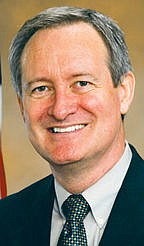Health of Idaho forests key to addressing wildfire costs
SEN. MIKE CRAPO Contributing Writer | Bonners Ferry Herald | UPDATED 2 years, 8 months AGO
Idaho has the unfortunate distinction of being in the top five states for acres burned by wildfire in 2022, including the disastrous Moose Fire that impacted Salmon, Idaho, and other nearby communities. The Moose Fire burned for more than 100 days and consumed more than 130,000 acres. Wildfires are burning longer and hotter, harming natural resources, wildlife habitat, budgets and workforces. They also carry an immense human toll, including the loss of firefighters who risk all to keep communities safe, health issues from smoke-clogged skies and lost homes and livelihoods. Tragically, three firefighting personnel lost their lives during the course of the Moose Fire, and it is important we remember their sacrifice. Improving forest health to reduce fire risk is a key part of the solution to addressing the enormous cost of wildfires, and I am continuing to advocate for federal legislation to improve the preparedness of federal land management agencies to alleviate wildfires.
I serve on the U.S. Senate Budget Committee that recently held a hearing to discuss the economic costs of wildfires. I had the opportunity to stress these points as part of the hearing record and question witnesses about where the federal government is lacking when it comes to wildfire suppression and prevention.
Like most of the western U.S., Idaho’s forests and other federal lands are prime locations for wildfire activity. These blazes are costly for all involved, including local, state, federal and private entities. I was proud to work with Senator Ron Wyden of Oregon, to pass the Wildfire Disaster Funding Act. This crucial legislation stopped the practice of “fire borrowing,” which forced the U.S. Forest Service to raid its fire prevention and forest health accounts to pay for large and expensive wildfires. Now, wildfires are rightfully classified as natural disasters and agencies can respond quickly without jeopardizing funding for wildfire reduction efforts.
In 2022, wildfires burned over 436,000 acres in Idaho alone. The vast majority of these fires burned on lands managed by the Forest Service or the Bureau of Land Management. Fifty-two percent of Idaho’s burned acreage this year were not caused by climate; instead, they are the result of wildfires started by humans.
No matter how a wildfire starts, it is evident they are burning longer and hotter due to poor management of our federal forests.
Solutions:
The first thing Congress must do is pass legislation to reverse the disastrous Cottonwood decision handed down by the Ninth Circuit. This decision provides a loophole for outside groups to effectively pause forestry activity by filing a lawsuit. I will continue working with my colleagues to pass bipartisan legislation reversing this decision. Passing a Cottonwood fix will reduce the risk of wildfires and allow agencies to partake in important wildfire restoration activities.
Congress should also consider further expediting the environmental review process for projects that remove invasive species, like cheatgrass and pinyon-juniper, from federal lands and forests.
Other proven methods, such as prescribed fires and targeted grazing, must also be part of the conversation.
Additionally, I joined fellow senators from western states, including fellow U.S. Senator for Idaho Jim Risch, in introducing legislation to reauthorize and expand the Collaborative Forest Landscape Restoration (CFLR) Program, which helps fund collaborative and community-based forest management. The CFLR program has a proven track record of improving forest health, reducing wildfire risk and supporting rural communities.
The severity of western wildfires makes clear we cannot let up in working to ensure firefighters and land management agencies have the resources necessary to prepare for wildfire response and reduce the threat of wildfires. I look forward to continuing the dialogue on these issues as we move forward in the 118th Congress.
• • •
Mike Crapo represents Idaho’s First Congressional District in the U.S. Senate. He can be reached at crapo.senate.gov.

